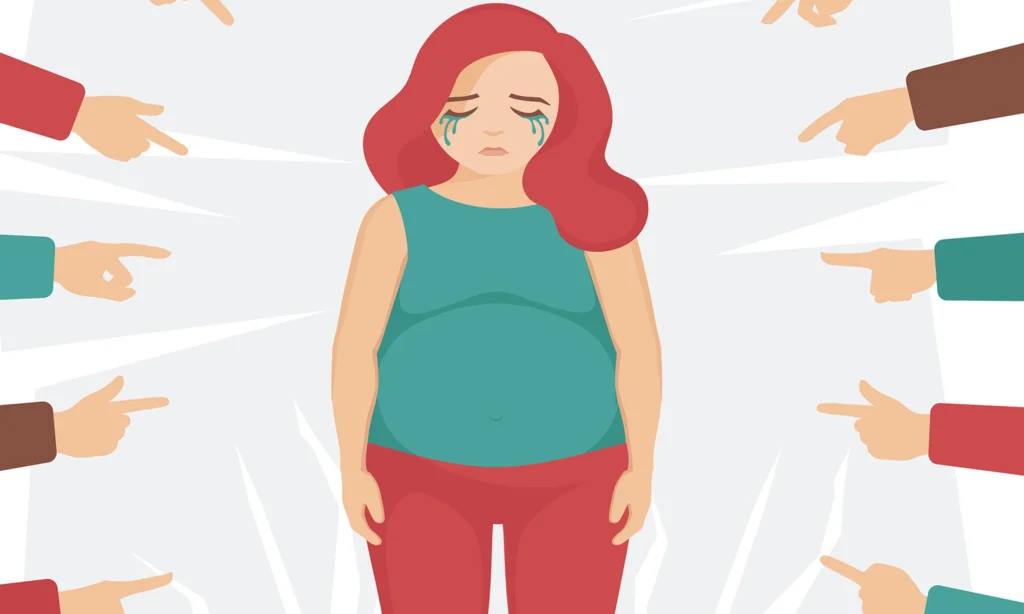- Web
- Feb 15, 2026
Understanding body shaming: causes and its prevalence in society
-

- Aneela Riazuddin
- Feb 22, 2025

Why have you become so fat?
Why are you looking so old?
Your face is looking so dull?
Who will marry YOU? and so on.
These are the phrases most girls and women hear from their spouses, relatives, co-workers and random people in their lives.
No wonder this contributes for most women to be seldom satisfied with their appearance. Commenting on someone’s looks, be it weight, facial features, hair, among other aspects comes under body shaming which appears to be a favourite past time for many. People often don’t even realise how much someone may get hurt through remarks about their body.
WEIGHT
One of the most common reasons people are body shamed is because of their weight. Someone might be body shamed for being “too big” or “too thin.”
While “fat shaming” is commonly discussed, criticism can also target being underweight or specific body features. This behavior can be directed at others or even yourself.
Zubia Zubair a certified counselor/therapist and psychologist, working at a renowned hospital in Islamabad explained while talking to Hum English: “You might feel dissatisfied with your appearance, judge yourself harshly, or engage in negative self-talk, such as saying, “I feel so fat today” or “I need to stop overeating”, she explained.
Body shaming can happen in person or through the internet and social media. It can come from parents, siblings, friends, or even strangers.

“I have had clients who have been told about their being overweight so many times that they have resorted to literally starving themselves”, Zubia lamented.
Fat shaming comments are ones like: “You will be more pretty if you lose the weight,” or “I bet you have to buy an extra plane ticket to fit.”; “ From which chakki do you buy the atta (From which mill are you getting your flour from?”; “ You have started to look older” and “No one marries fat girls”.

“I have been told so many times how much I have gained weight over the time that I do not even want to look in the mirror or go to any family functions,” Nimra a college student shared with Hum English.
“At first after hearing comments about my body weight I used to isolate myself from meeting people and going to functions. But over time I realised that it is their own complexes that they are lashing out on me. I don’t need to change for anyone except for myself”, Rohma, another student narrated her experience.
“Now I have become confident and anyone who even attempts to shame me gets a “befitting response”, she said smilingly.
People who lean toward the other side and have bodies can also be shamed for their weight. Often called skinny shaming, it may sound like, “they look like they never eat” or “looks like they have an eating disorder”; “chipkli (lizard) lag rahi hai” (she looks like a lizard).
The urge to comment on someone whether they are skinny or fat should be restrained, however, it is seldom that a person who loses weight (even if for medical conditions) is not commended rather they are often asked the ‘secret of losing weight’.
LOOKS
The bullying or discrimination of people based on their facial features or skin tone is also something that happens regularly.
And even more than that, people are bullied for being considered unattractive, which is also known as “lookism”, according to Asma Qureshi, a clinical psychologist.
Lookism describes prejudice or discrimination against people who are considered physically unattractive or whose physical appearance is believed to fall short of societal ideas of beauty, she said.

Pretty-shaming comments include: “you should start using whitening creams for your dark complexion”; “ why you are getting so many pimples on your face?”, “ your skin has become so dull looking”.
Body shaming can begin as early as a child’s birth or even during pregnancy, often by parents. For instance, if one parent is considered good-looking while the other is average-looking or has a darker complexion, people may comment, “I hope the baby inherits the father’s good looks,” or vice versa.
“A woman once came to me, complaining that her husband is average-looking and has a darker complexion. She was anxious because her in-laws are also not good-looking, and she feared her baby would resemble them,” Asma revealed.
She was made so self-conscious of this fact, that she could not sleep at nights.
“When I was growing up I always had comments about why you are not as fair and beautiful as your other siblings. My siblings also use to tease me that you are adopted. I had started resenting them and became socially isolated. I was made to feel like a black sheep of the family”, Maham, who works a corporate job, told while talking to Hum English.
AGE
Age shaming, also called ageism, is discrimination or bullying based on someone’s age, often targeting older individuals.
In the context of body-shaming, ageist remarks might include statements like, “They’re too old to wear that much makeup”, “They should not wear such colours”, “clothing style is not suitable at this age”.

Criticising people for looking “bad” or “old” also perpetuates age-shaming, Asma explained. Making negative comments about wrinkles, loose skin or hair colour is another example of this behaviour.
LASTING IMPACTS
Body shaming can have a lasting impact not only mentally but also on physical health. It can lead to social isolation. Some people become obsessed with food either they binge up or starve, and thus end up punishing themselves, Zubia said.
It is not gender related issue and not only isolated to women only. Even men and children are body shamed, she said. “Children who grow up in such an environment often have low self-esteem and eating disorders, depression, anxiety, and body dysmorphia, as well as the general feeling of hating one’s body,” Asma explained.
It is often not outsiders who are bullying or body shaming you but your parents, siblings, grandparents or other close relatives.
HOW TO BREAK THE CHAIN OF TOXICITY
According to our experts:
- Introduce positive changes in your life.
- Surround yourself with friends who accept you as you are.
- Be assertive with those who body-shame you; let them know you dislike such comments.
- Embrace and feel comfortable in your own skin.
- Be grateful for what you have and confident in being yourself.
- Maintain a balanced diet and avoid junk and processed food.
- Avoid negativity towards others; focus on breaking the cycle of toxicity.
- Limit social media usage and engage with motivational and healthy content.
- Don’t allow yourself to be treated like a doormat.
- Participate in healthy activities to promote self-esteem.
If someone you care about is dealing with such trauma, consulting a psychologist for counseling is essential, and one should seek help instead of relying on methods that are injurious to health.




